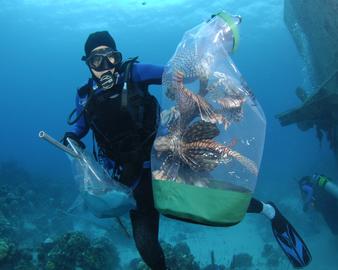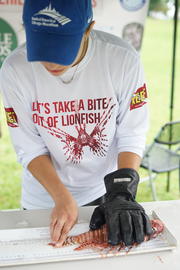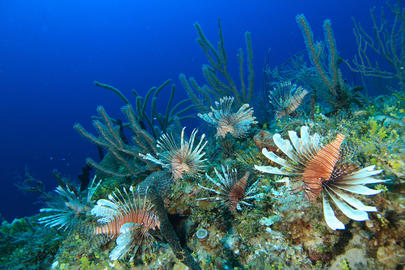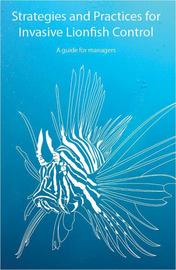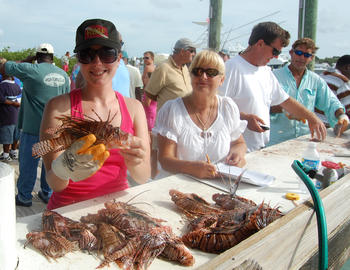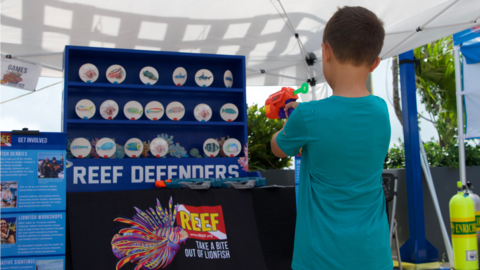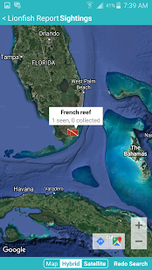REEF staff co-authored a new publication in the scientific journal PeerJ that features research findings from our Invasive Lionfish Research Program. The paper, titled "Setting the record straight on invasive lionfish control: Culling works", evaluates the effectiveness of lionfish removal efforts. Frequent culling of the invasive Indo-Pacific Lionfish throughout the Caribbean has been shown to cause a shift towards more wary and reclusive behavior by lionfish, which has prompted calls for halting culls.
Mark your calendars! The 16th Annual Florida Keys Lionfish Derby & Arts Festival is coming up this month, on April 24-27, 2025. This event blends ocean conservation, art, science, and community fun, and it's free and open to the public! Join us for a weekend of lionfish hunting, eco-art, ocean education, and family-friendly festivities. The Lionfish Derby engages divers in a thrilling competition to remove as many invasive lionfish as possible, helping protect native marine ecosystems.
We are so excited for the 16th annual Florida Keys Lionfish Derby & Arts Festival! Starting this year, we are combining the Florida Keys Lionfish Derby with the annual Arts & Science Festival to form a conservation and arts festival! It will all take place at the REEF Campus and will feature vendors including artisans and local non-profits, along with lionfish scoring, fun conservation science and art activities, music, educational and cooking demos, food trucks and drinks, free lionfish tastings, raffle, and derby awards ceremony!
Last month, REEF kicked off our 2018 Lionfish Derby series at the Phillip and Patricia Frost Museum of Science in Miami. Four teams competed on June 9 and 10 to bring in a total of 309 fish. The largest lionfish caught was 411mm (just over 16 inches) and the smallest was 112mm (about 4.5 inches.) We have two more derbies coming up this month - in Sarasota at Mote Marine Lab and Aquarium on July 6 - 8, and in Ft. Lauderdale at 15th St. Fisheries on July 13 - 14, and a few more later this summer and fall.
REEF is continuing our ground-breaking research and outreach on the lionfish invasion with projects in Puerto Rico and the US Virgin Islands. The project is supported with funding from the NOAA Coral Reef Conservation Grant and the Buck Island REEF National Park and long-time supporters Henry Foundation, Oceans Foundation and Munson Foundation.
REEF, in collaboration with the University of Virgin Islands and Buck Island National Monument, took a major step last week in a novel study to better understand lionfish movement and factors that may influence that movement. The study, focusing on a 2km area of patch and continuous reef in St Croix, used innovative underwater tagging techniques pioneered by REEF to surgically implant transmitters into invasive lionfish within an array of receivers, allowing the team to pinpoint movement of the fish over the next year.
REEF is excited to announce the release of Invasive Lionfish: A Guide to Control and Management. Available as an e-book to view and/or download (formatted for desktop and mobile devices), this extensive manual was created to aid coastal managers and field workers in effectively managing the invasive lionfish problem.
We are excited to share the latest publication stemming from REEF's Invasive Lionfish Research Program - "Mobilizing volunteers to sustain local suppression of a global marine invasion," recently published in the scientific journal Conservation Letters.
Be sure to join us for the Florida Keys Lionfish Derby & Festival on Sept. 7-10, 2023! The event includes two days to collect as many invasive lionfish as possible, followed by a family-friendly lionfish festival hosted at the picturesque Postcard Inn Beach Resort & Marina in Islamorada. The festival is open to the public and features lionfish tastings, drink specials, educational demonstrations, games, interactive booths from environmental vendors, live music, and more. Visit www.REEF.org/derby for all the details.
REEF is exctied to announce the launch of our new Lionfish Sightings App – a free app designed specifically to connect divers to remove lionfish from the Tropical Western Atlantic. Report lionfish you have collected or simply report lionfish sightings so other divers know where to look! Follow this link to download the app for iOS or follow this link to download the app for Android.

